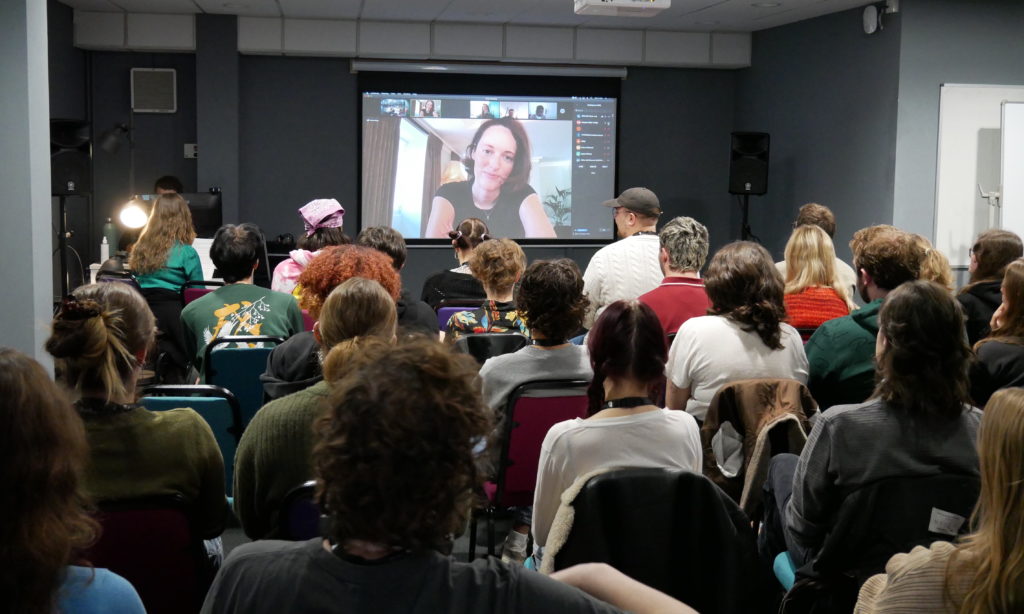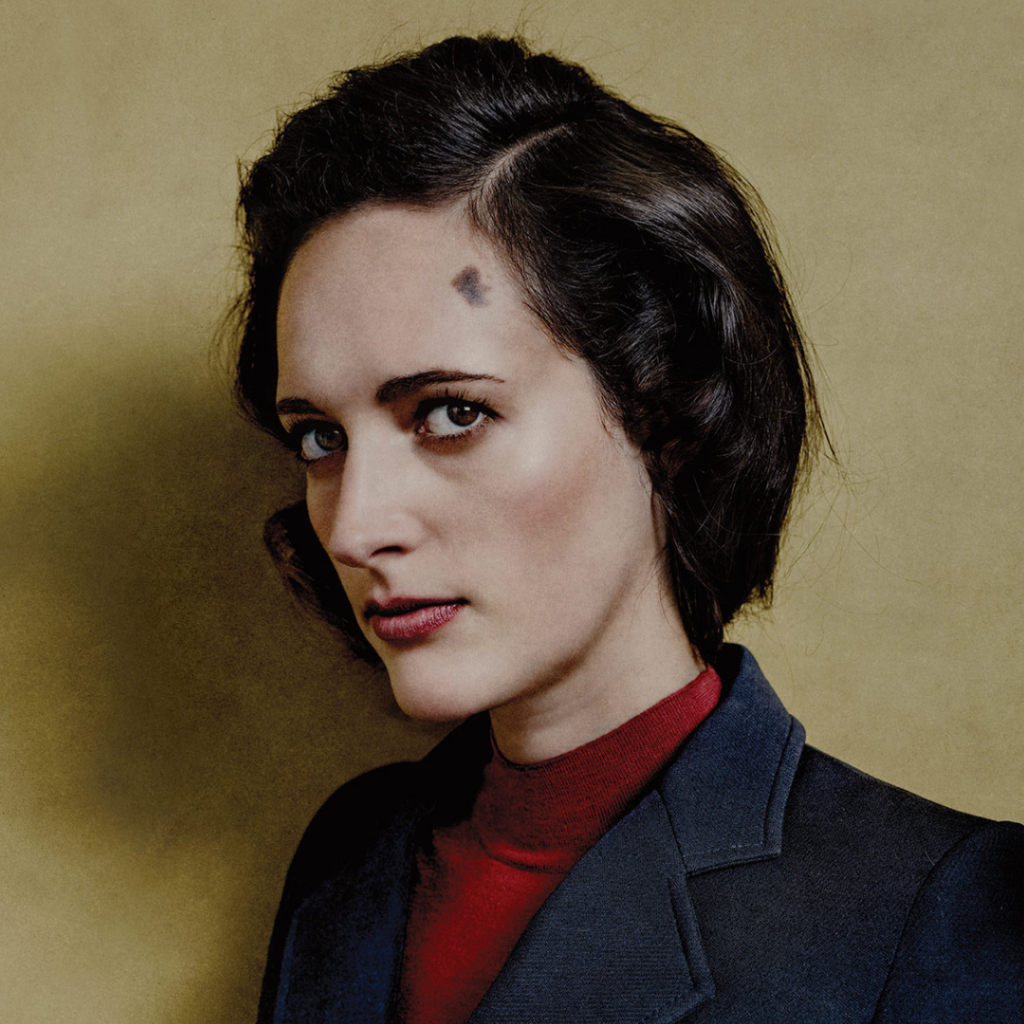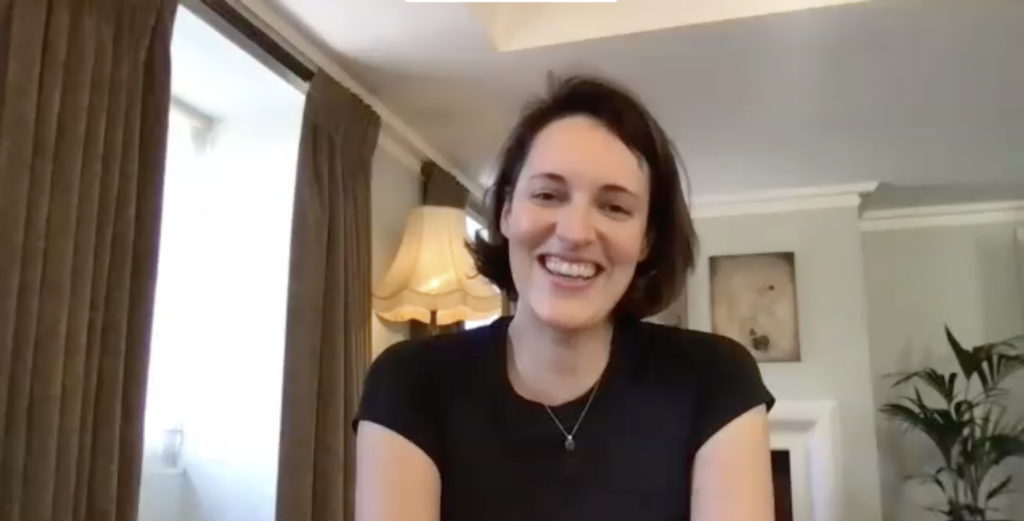In conversation with Phoebe Waller-Bridge, award-winning actress, producer and writer
Screen and Film School Brighton were delighted to have recently welcomed BAFTA, Emmy and Golden Globe award-winning actress, producer and writer Phoebe Waller-Bridge for an exclusive masterclass.
The event, which took place online via Zoom, received record-breaking attendance numbers, with more than half of the Film School’s student body as well as members of the alumni community tuning in live.
Phoebe is the main creative force behind successful TV series’ such as Channel 4’s Crashing, the BBC’s Killing Eve and the award-winning comedy-drama Fleabag. In 2020, Phoebe was enlisted to “punch up” the script to the most recent James Bond instalment, No Time To Die, and is quoted by its Producer Michael G. Wilson as making ‘a major contribution to the whole movie.’ Her upcoming project sees Phoebe playing the character of Helena in the new Indian Jones film, due for release in 2023.
This dual experience both behind and in front of the camera makes Phoebe’s professional outlook one that’s of particular interest to many of our student filmmakers. Which is why this masterclass was a student takeover – an event which sees all questions coming from the students alone.
Here are just some of the highlights.
What do you love the most about what you do?
Wojtek – First Year BA (Hons) Filmmaking degree
“I love that you can do really dangerous things in storytelling. As an audience member, I want to be surprised and totally transported to a different place for a second. So, to be the puppeteer and make that experience happen for another person is such a high. I love coming up with a story and telling it in a way that is surprising and affecting to people.”
How much of your life experience has gone into the characters that you’ve created?
Emily, Professional Diploma graduate.
“Quite a lot! Fleabag, particularly. It’s not autobiographical – there’s a definitive plot based on characters I’ve invented. But the stories that go in and the ache of it all are incredibly personal to me. I’d be inspired by someone I’d met on public transport, and that would start an idea for a character. It’s a wonderful thing for the writers out there, when something like a bad date can suddenly become very valuable and positive, because you can get something from it.”
She continued: “Whenever I’m writing something, no matter what genre or period it’s in, I always try and work out what it is that I’m feeling at that time and try and put that into it. Because that is the only way that it will become present. Interpreting the things that are making you happy, or angry or are making you laugh, and really drilling down and placing that at the beating heart of what you’re writing, is really important.”
Do you often get a creative block and how do you overcome it?
Hana – BA (hons) Production Design for Screen and Film
“Yes! Sometimes you just need to remember the simple things. Reading something else really helps. Reading some fiction – even if it’s just three pages of a novel – wakes up a different part of your brain and you’re reminded that there’s this whole other world out there. More holistically though, I do think there’s something to be said for just putting it aside and doing something else. Because there’s some writing that is really fun and there’s some that is just so devastatingly hard.
“If you’re struggling with one thing, trick yourself by just saying ‘that’s just in the bin, now. It’s gone.’ And then just write something silly, like a description of somebody you saw at a bus stop that morning and do it with love.”
How do you deal with self-doubt during the writing process?
Isaac – First year BA (Hons) Filmmaking Degree
“I’m so critical, to the point that I can completely paralyse myself. So, I feel this question. You just have to keep going. That’s the mortifying thing. Even if what you’re writing is rubbish. Just let it be rubbish. That’s the thing I find so hard. I know I have the capability to write great stuff. So, it’s difficult to settle for anything less than that.
“But have faith that your creative cycle is a cycle. You might struggle for five months, but then you might get half an hour when it all comes out. It’s hard being a creative person. You’re constantly using your brain in a way that other people don’t have to. Creation can be so painful, but just know and trust in the process. Even if it may take some time.
“I had a joke which I wrote years ago that I tried to get into ‘Crashing’, then ‘Fleabag’, and then ‘Killing Eve’ – I just loved it so much but it wasn’t working. Then suddenly it popped up and worked in something else completely surprising! So, trust in your own crazy system.”
What’s your main advice for blending comedy with drama when writing?
Joseph – 3rd year, BA (Hons) Filmmaking
“If you see it simply as building and releasing tension, then drama and comedy can work really well together. As long as it’s rooted in character, the two things should balance quite naturally. If you’ve got a really serious scene, just write something funny and see how it affects the rest of the scene. As long as it’s pushing things on, then you’re in a good place. Finding that balance is hard, but when you get it, it’s what feels most like real life.”
When you are writing a script, do you write about the kind of camera direction or look you want from a scene?
Jessica – BA (Hons) Filmmaking Degree Alumna
“I’d always been a believer in leaving as much up to the actors as possible. So, I never want to be too prescriptive. I would always just write it quite baldly. But then I started working with Directors, which taught me to capture the direction in detail, but succinctly. You have to set a tone with your stage directions. But it’s also really important when working with a director to go through the script with them, saying exactly how you feel. Because there’s nothing more heart-breaking than the story not being told in the best way. I would say put it all in but as succinctly as you possibly can.”
Have you dealt with sexism/being treated differently in the workplace, specifically when working as a female director/producer?
Christina – First year BA(Hons) Filmmaking
“Oh, it’s definitely out there. And I’ve experience the same everyday microaggressions that everyone else has. But the strange thing is that the higher you ascend in this industry, the more complicated the egos are.
“What I’d say is, the knowledge that you can do it on your own, that you can find your own people and ‘make it’ – especially these days when you can take your play to Edinburgh or make something and post it online – that is such a powerful thing; as a man, as a woman, as anyone trying to get over prejudice. I also believe strongly that if the material is funny, no one can touch it.”
What advice would you wish you were given early in your career?
Adam, BA (hons) Filmmaking Top up Degree
“If I could go back to when I started out, and I mean this from the bottom of my heart, particularly with writing and making my own stuff, I would ask younger me for advice. Because, when I was starting out, I was fearless. I had nothing to lose. No one was watching, because nobody cared. And so, I was throwing everything at the wall. That fearless, almost punky mindset, that energy is the thing that I’m constantly trying to find again.
“Back then, I had this fierce dedication to making this one thing good, and then the next thing good and the next thing. And I imagine that fearlessness is something which some of you are feeling now. And if you’re not feeling that, know that now is the time to really take those risks. Because it’s so much fun and you’ll never get the time again where you can really do that.”
As the enlightening Masterclass session drew to a close, Phoebe thanked everyone who had joined, wishing them well for the future and saying how she can’t wait to come and meet them in person someday.
Screen and Film School Brighton are incredibly thankful to Phoebe for taking the time to answer our student’s questions and we look forward to seeing what other exciting projects she has in store.
A big thank you also goes out to our Industry Engagement officer, Fiona Adams, who was instrumental in securing such a special Masterclass guest for our students.
Are you interested in being a part of the new legacy at Screen and Film School Brighton?
Sign up to one of our Open Days:
Find out more information on our courses by clicking below:





